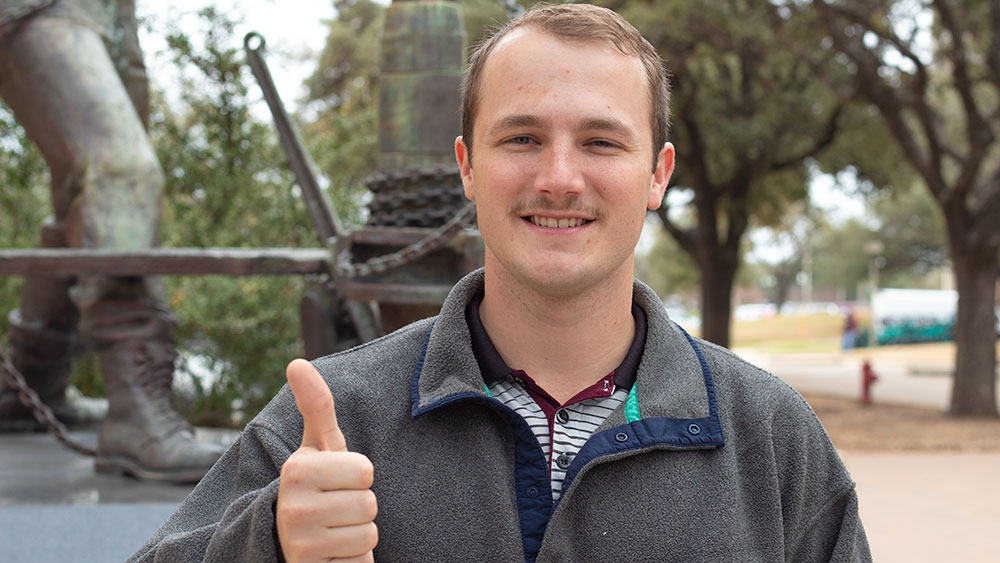
“I grew up using my hands a lot — restoring tractors, small engines, everything like that — so I don’t mind getting dirty. I understand hard work,” said Blake Ropers ’23.
While he might sound like a mechanic in the making, Ropers will graduate in December 2023 as a petroleum engineer. He fully admits that he pigeonholed himself by only applying to Texas A&M University and only thinking of petroleum engineering when choosing a major. However, this young man had a plan in mind, even if coming to College Station, Texas, was a challenge.
“You come from high school being at the very top, and then you come into college as a freshman, and you’re right at the bottom again,” said Ropers.
As a freshman, the first thing he did was join the Texas A&M student chapter of the Society of Petroleum Engineers (TAMU-SPE). A family member from the class of ’86 told him about the organization, and Ropers decided he should learn from students while he learned from faculty.
“At first, it was intimidating, dealing with upperclassmen,” Ropers said. “But as soon as I joined, I started as a co-chair for the tailgating committee. I’ve been involved in TAMU-SPE ever since.”
Co-chairing a committee was a great way to learn the ropes and make friends. The position also allowed him to meet chapter officers and make mentor connections. Ropers’ work ethic impressed them, as did his belief that it’s worth talking to and learning from everyone.
One of his mentors, who had just interned with a drilling company, recommended Ropers for an internship position. The company agreed, but COVID-19 restrictions put the plans on hold. Ropers worked the summer after his first year in college restoring machinery instead, but he didn’t forget the kindness of that recommendation.
“I think petroleum attracts a certain person,” Ropers said. “And maybe that’s the difference between what petroleum engineering encompasses and what I feel most other majors are.”
Ropers explained that petroleum is not like other engineering disciplines, which are “right in front of you” in terms of being able to see something. Instead, a petroleum engineering student must fully understand math, science and physics because the field involves “extremely thorough” guesswork. Working with out-of-sight situations deep underground means all petroleum engineers share the challenge of getting good results through intangible means. That shared challenge forges soft, critical skills in problem-solving, communication and teamwork.
“Everyone understands networking and handing out business cards, but you build relationships through being kind to someone,” said Ropers. “From there, you can express your technical knowledge and be successful through that.”
The summer after his sophomore year, Ropers worked for the drilling company that promised to hire him as an intern. Yet, he made a successful but unintended connection before that summer, which landed him a double internship. At a TAMU-SPE lunch-and-learn event, he thanked the speaker who came to teach students more about the oilfield service industry. The representative was impressed with Ropers’ questions and kindness and asked for a resume. Later, he made a job offer. Ropers explained he had a prior commitment to working two weeks on and two weeks off on an oil rig. Since the rig was only two hours down the road, the service company had Ropers work his free weeks with them.
“Currently, I’m a mentor for a sophomore, and I can happily say I was able to recommend him for an internship through that experience, and he’s happily accepted,” said Ropers. “That means a lot to me. Both my jobs came through TAMU-SPE, and I was able to help someone else.”
Ropers said his field of choice would be a drilling engineer, despite doing an internship where he worked over 12 hours a day on a rig for 14 days at a time. The tough experience helped him understand the hard labor needed in drilling and the skills used by teams of people succeeding together.
“A drilling engineer is the one covered in oil-based mud at the end of the day,” Roper explained. “They’re out there, and they want to be a part of the team. I can connect very well with people out there. I respect them. And I feel I could do a good job keeping everyone safe and be extremely productive while being out there.”
Ropers increased his personal productivity this spring semester by working many of his weekends as a pumper for fields in north Bryan, Texas. He was responsible for up to 18 wells at a time, and the duties ranged from gaging oil and water tanks to maintaining pump jacks to adjusting wellheads.
He said his education in the Harold Vance Department of Petroleum Engineering has been fantastic. And he takes advantage of every opportunity to ask questions, especially from the professors of practice. Ropers counts the times they share practical advice from working offshore drilling rigs, starting or managing companies, and relating with others in a global industry as the most valuable of his lessons. This is the knowledge he knows he needs to work better and smarter with people no matter where he ends up.
“I come from Tomball, which does have different cultures, but you don’t get exposed to much,” Ropers said. “Other languages, other cultures, other people — they’re fantastic. Seeing different things is so exciting. This kind of engineering will let me see the world while I’m young — branch out and learn as much as possible.”